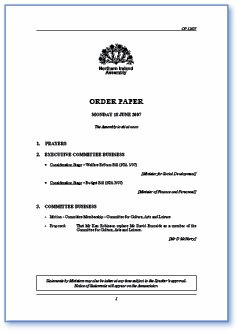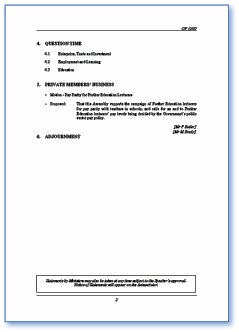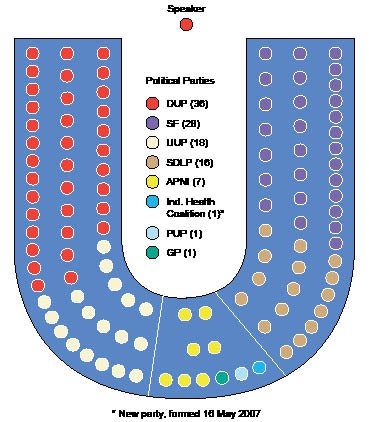Factsheet 1
Plenary Sessions of the Northern Ireland Assembly
Introduction
A plenary session (or “sitting”) is a meeting of the full Assembly, which normally takes place in the Assembly Chamber in Parliament Buildings.
Assembly sittings
The vast majority of plenary sessions are held on Mondays and Tuesdays, but they can take place on any day. Sittings normally start at noon on Monday and 10.30 am on Tuesday and finish at 6.00 pm. A Monday sitting may be extended until 7.00 pm A Tueday sitting may be extended into the evening, into Wednesday, or both. If all the day’s business has been dealt with, a sitting may adjourn earlier than planned.
“Recess” refers to periods during which plenary sessions are not normally scheduled (Halloween, Christmas, Easter and the summer), although additional sittings may be arranged during recess in special circumstances. The Assembly year (or “Session”) runs from the start of business after a summer recess to the end of the following summer recess.
The Business Committee, which meets weekly, agrees the business for a plenary session and this is set out on an Order Paper for each day’s sitting. The order in which Executive Committee business is taken is a matter for the Executive. Business on the Order Paper will normally continue without interruption until it is completed, or until the finishing time for that day is reached.
Order Paper


How proceedings are regulated
Assembly proceedings in the Chamber are regulated by the Assembly’s Standing Orders which are available on the website archive.niassembly.gov.uk.
Legislation, such as the Northern Ireland Act 1998, also affects the Assembly’s operation, with amendments to legislation often resulting in amendments to procedures in plenary session. Speaker’s rulings, along with convention and practice, also help to regulate proceedings.
Role of the Speaker
In the Assembly Chamber, the Speaker presides over meetings from the Chair (which is situated at the Speaker’s Table at one end of the Chamber). Duties include calling Members to speak, ensuring that procedure is followed and order is maintained, and giving rulings on procedure and Members’ points of order. Three Deputy Speakers are normally elected by the Assembly, and they will perform these duties in the Speaker’s absence. The Speaker (or a Deputy Speaker while in the Chair) cannot vote on any matter.
Who sits where?
Prior to the first plenary session following an Assembly election, parties agree on an allocation of seats within the Assembly Chamber. Front and second-row seats are allocated broadly in line with party strength (i.e. numbers of Members elected). Using these allocated seats, and seats in the back row (sometimes called the “backbenches”), parties form ‘blocks’ of Members in the Chamber. This diagram shows the ‘blocks’ in the Assembly at the start of the summer recess in July 2007:

A member of staff sits at the Table on each side of the Speaker/Deputy Speaker. The most senior Clerks in the Assembly normally undertake this role, providing procedural and administrative support to the Chair.
The Head of Security and senior doorkeepers take up positions close to the doors at the front and rear of the Chamber, while officials (usually civil servants supporting a Minister) occupy the ‘Officials’ boxes’, from which there is no access to the debating floor of the Chamber. Members of the public, the press, and Members’ and VIP guests may sit in the first floor galleries which overlook the Chamber.
Speaking opportunities
Each party will advise the Speaker when any of its Members wish to speak in a particular debate, and the party’s order of preference for calling those Members. In calling Members to speak, the Speaker will take account of party strengths, while trying to ensure that a variety and balance of opinions is aired in debate. The Speaker’s discretion allows for smaller parties, independents and backbenchers to be called, perhaps where they have a particular interest in a subject. If called, a Member may speak in the language of his or her choice, but must provide a translation if speaking in a language other than English.
Decisions of the Assembly
Assembly decisions are made by way of motions (see Order Paper for examples), with the ‘question being put’ to the Assembly for a decision on each motion. Most decisions are agreed by a simple majority of Members. Certain decisions, however, (such as proposed amendments to Standing Orders) require cross-community support. This may be done in two ways:
• Parallel Consent where over 50% of Members voting, including over 50% of Nationalists and over 50% of Unionists voting, all agree to the motion; or
• A Weighted Majority which requires the support of 60% of those voting, including 40% Unionist and 40% Nationalist support.
The Assembly’s decision is often clear to the Speaker, with Members agreeing with a motion by saying “Aye” when the question is put, or disagreeing with it by saying “No”.
However, if the Assembly’s decision is unclear, or if Members challenge the Speaker’s view on the decision, a more formal, recorded vote will take place. This involves Members going down one of the two voting lobbies at the sides of the Chamber (the “Aye” lobby is to the Speaker’s right) and having their names recorded by a Clerk. Two “Tellers” in each lobby (one Member from each side of the argument) supervise this process, which is called a “division”, at the end of which the result is read into the record by one of the Clerks.
Records and Reports of the Assembly
Minutes of the Assembly’s proceedings are printed for each sitting. These record the Assembly’s decisions and results of divisions and are published periodically as the Assembly’s “Journal of Proceedings”.
An Official Report (Hansard) is produced for all sittings of the Assembly, and is a substantially verbatim report of the proceedings. The report is published in hard copy format, and on the Assembly website, the day following the sitting.
Assembly Information
Public Information Service
Northern Ireland Assembly
Parliament Buildings
Belfast, BT4 3XX
NIA General Enquiries
Tel: +44 (0)28 9052 1333
Fax: +44 (0)28 9052 1980
Email: info@niassembly.gov.uk
Quick Facts
- Plenary sessions normally take place from noon on Mondays and from 10.30 am on Tuesdays.
- Assembly proceedings are regulated by Standing Orders.
- The Speaker presides over proceedings of the Assembly.
